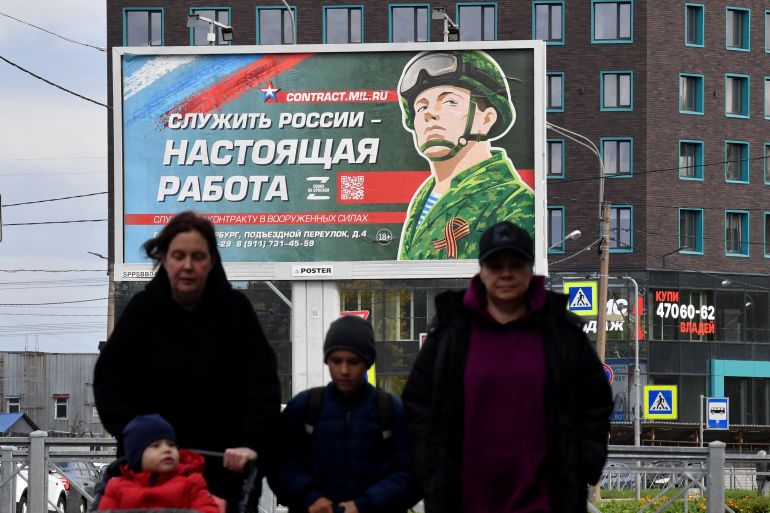Putin’s plan: What does partial mobilisation mean?
Russian President Vladimir Putin has signed a decree that will see 300,000 reservists called to fight in Ukraine.

Russian President Vladimir Putin has ordered a partial mobilisation after Moscow’s troops suffered losses in Ukraine.
In a televised address on Wednesday, Putin warned Western nations supporting Ukraine that Moscow would defend itself with the might of all its vast arsenal if faced with a nuclear threat from the West.
The blunt warning from Russia’s leader marks the biggest escalation of the war since Moscow’s February 24 invasion of Ukraine began and accompanied the decision to call up 300,000 extra reservists.
Here is what we know:
What did President Vladimir Putin say?
- On September 21, President Vladimir Putin ordered Russia’s first mobilisation since World War II in an early-morning, pre-recorded televised address, saying additional manpower was needed to win a war against Ukraine and its Western backers.
- “To protect our motherland, its sovereignty and territorial integrity, and to ensure the safety of our people and people in the liberated territories, I consider it necessary to support the proposal of the defence ministry and the General Staff to conduct a partial mobilisation in the Russian Federation,” Putin said.
- “We are talking about partial mobilisation. That is, only citizens who are currently in the reserves and, above all, those who have served in the armed forces have military skills and relevant experience. Only they will be subject to conscription,” he added.
- “Conscripts will obligatorily go through additional military training based on the experience of the special military operation before departing to the units,” Putin said, according to an Associated Press news agency translation.
- Putin’s speech came after seven months of fighting and follows recent battlefield losses for Moscow’s forces.
- It also came a day after Russian-controlled regions in eastern and southern Ukraine announced plans to hold votes on becoming integral parts of Russia – a move that could set the stage for Moscow to escalate the war following Ukrainian successes.
What does partial mobilisation mean?
- Putin said the conscription will begin on Wednesday, without providing much detail.
- Sergei Shoigu, Russia’s defence minister, said he expected 300,000 people to be called up out of the country’s vast reserves of about 25 million people.
- Only those with relevant combat and service experience will be called up. Shoigu said that approximately 25 million people fit this brief, but only about 1 percent will be drafted in.
- “In general, a full mobilisation would mean that any military-aged man, 18 to 60-year-olds, could not leave Russia and would need to join the military. It’s unclear if this partial mobilisation means that,” said Al Jazeera’s Gabriel Elizondo, reporting from Kyiv, Ukraine.
- The UK’s defence ministry said the move was likely intended to limit the number of desertions and designed to mitigate immediate pressures on the military.
- Arme Petimezas, a senior analyst at AFS group, told the Reuters news agency: “It is not yet a total war for Russia because there is no full mobilisation. But I think Putin is underestimated. He has escalated every time. For him, it is life and death. I don’t see why his next move will be de-escalation unless he wins.”
(6/7)
The Russian civilian and military leadership has faced significant pressure over the last two weeks. These new measures have highly likely been brought forwards due to public criticism and mark a further development in Russia’s strategy.
— Ministry of Defence 🇬🇧 (@DefenceHQ) September 21, 2022
What did Ukraine say?
- Ukrainian officials have roundly ridiculed Russia’s latest steps towards annexation and mobilisation, saying Moscow is behaving in a desperate manner having faced battlefield defeats.
- Ukrainian President Volodymyr Zelenskyy’s adviser, Mykhailo Podolyak, mocked Moscow’s latest steps in a Twitter post.
- “Everything is still according to the plan, right? Life has a great sense of humour,” he wrote.
- “210th day of the ‘three-day war’. Russians who demanded the destruction of Ukraine ended up getting: 1. Mobilisation 2. Closed borders, blocking of bank accounts, 3. Prison for desertion,” said Podolyak.
210th day of the "three-day war". Russians who demanded the destruction of 🇺🇦 ended up getting:
1. Mobilization.
2. Closed borders, blocking of bank accounts.
3. Prison for desertion.Everything is still according to the plan, right? Life has a great sense of humor.
— Михайло Подоляк (@Podolyak_M) September 21, 2022
What were the immediate economic effects?
- The euro tumbled to a two-week low against the dollar, European stock markets slipped, and investors piled into safe-haven bonds, pushing yields on German and US government debt down.
- Investors sought the safety of US Treasurys and the Japanese yen.
- British and Dutch gas prices rose amid fears of a renewed hit to global financial and energy markets.
- Russia’s rouble slumped to a more than two-month low, heading towards 63 to the dollar.
- “The initial implications are clear: it’s a potential escalation which is negative for the outlook in the eurozone, and so it’s unsurprising that the euro is weaker. It has boosted risk aversion more broadly, so the dollar is stronger,” Colin Asher, a senior economist at Mizuho Corporate Bank, told Reuters.
- “It was interesting to me that dollar/yen dipped on the news of the announcement, potentially indicating a return of the yen’s safe-haven credentials, which have been absent for much of the year.”